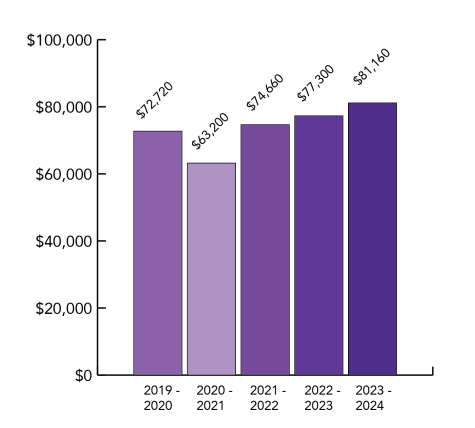College increases comprehensive fee to $81,160 for 2023-2024 school year
March 15, 2023

The comprehensive fee for the 2023-2024 academic year will be $81,160, a five-percent increase from this year’s fee of $77,300. The College will adjust students’ financial aid packages in accordance with the new fee, however, so that the change does not increase the amount that recipients of financial aid and their families must pay.
The 2019-2020 comprehensive fee was $72,720. For 2020-2021, the fee dropped to $63,200 due to the COVID-19 pandemic and its limitations on the student experiences. In the 2021-2022 school year, the fee increased to $74,660, and this year, it rose again to $77,300.
Each fall, Vice President for Finance and Operations Mike Wagner, Provost Eiko Maruko Siniawer ’97, President Maud S. Mandel, and other members of the College’s finance office discuss the fee for the coming year, taking into consideration previous years’ fees, other peer institutions’ fees, and inflation. The Board of Trustees must approve the coming year’s fee before it is finalized, Wagner said in an interview with the Record.
Last year, the College raised its comprehensive fee by 3.5 percent. The five-percent increase this year is greater than last year’s due to inflation, Wagner said. (The consumer price index has increased by six percent since February 2022.) “In terms of [the] pay that’s required to recruit and retain people, [pay] benefit costs, energy costs, food costs, materials — anything you can imagine that goes into operating the College — the costs have been growing by these inflationary rates,” he said. Because the increase in the fee is less than the inflation rate, the cost of tuition for families who do not receive financial aid is declining in real terms.
The net tuition — the total amount paid by the student body, taking financial aid into consideration — covers approximately one quarter of the College’s total expenses. Money drawn from the endowment, alongside donations and other sources of funding, assists in covering the remaining costs, Wagner said.
“Students who are on aid will not pay more, and that was a really important factor — to make sure we understood what the impact was going to be on students on aid,” he added.
“We understand that paying for college is a large and meaningful investment in your future,” Wagner wrote in his email announcing the comprehensive fee to the Classes of 2024, 2025, and 2026 on March 1. “We try to limit annual increases, while prudently investing in people and programs that will provide you with an education of lifelong value, well beyond the sticker price.”
In recent years, the College’s fee has been lower than that of peer institutions. This year, the College’s comprehensive fee of $77,300 was the lowest in the NESCAC and the seventh-lowest out of the 39 schools in the Consortium on Financing Higher Education. In recent weeks, peer institutions have released information about their comprehensive fees for the next academic year. Stanford announced that its fee would be $82,406; Yale, $83,880; and Middlebury, $83,000. The College will continue to monitor announcements from other colleges and universities as they are released, Wagner said.








